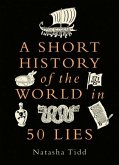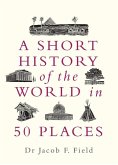Although best known for his scientific romances that paved the way for the modern science fiction genre, H. G. Wells (1866-1946) produced significant works on politics, society, science and history. Fascinated as much with the real world as his imaginary one, and displeased with the quality of history textbooks at the end of World War I, Wells took on the task of writing his own book of world history. In 1919 he published "The Outline of History," a 1,324-page book in three volumes, which he soon followed with the much shorter and highly popular work, "A Short History of the World." This condensed work is a monumental account of the physical, spiritual, and intellectual evolution of the human race, and chronicles key events of humanity's development. More importantly, Wells brings to light the continuity of history, and provokes thoughts on the future implications of our scientific and intellectual progress.
Hinweis: Dieser Artikel kann nur an eine deutsche Lieferadresse ausgeliefert werden.
Hinweis: Dieser Artikel kann nur an eine deutsche Lieferadresse ausgeliefert werden.








